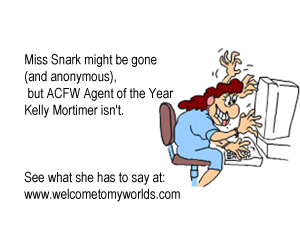|
In
case you’re behind on the
happenin’ lingo, that phrase means “awesome”! And if you wanna to be an
awesome full-time writer (who can afford to eat), you’d better learn
what a “hook” is, and when to use one.
Hook: anything
that catches; snares; traps. Something that attracts attention or
serves as an enticement.
A snare. A trap. Attention.
Enticement. Aren't those words ya want people to think about when
reading your story? (If you have even half a brain, the answer is yes.)
Okay, so when do ya use a hook?
 Your
first sentence. Yep, your
first sentence should be your first hook. I know an editor who’ll read
the opening line of a submission, and if it doesn't grab her, file 13
grabs the submission. (Said editor’s name shall remain in the vault, as
no one can bribe me to divulge. Pammer, put away those Trader Joe’s
Lowfat Cheespuffs right now!) Yeah, so that editor is an extreme case.
Regardless, hooks are a vital tool to get a reader interested, and then
keep them reading. Your
first sentence. Yep, your
first sentence should be your first hook. I know an editor who’ll read
the opening line of a submission, and if it doesn't grab her, file 13
grabs the submission. (Said editor’s name shall remain in the vault, as
no one can bribe me to divulge. Pammer, put away those Trader Joe’s
Lowfat Cheespuffs right now!) Yeah, so that editor is an extreme case.
Regardless, hooks are a vital tool to get a reader interested, and then
keep them reading.
Here’s an example of an opener
without a hook: Jackie McCall looked at the blue sky.
Yawn! Do we care why Jackie is looking at the sky? I don’t. (Nothing
personal, Jackie.) We know what color the sky is. Even the choice of
color word is boring. Blue? You know how many hues of blue there are?
Neither do I, but there’s plenty. You get my point. That sentence has
no interesting components. (Yes, I wrote it, but I wrote a boring
sentence on purpose. I struggled, but finally came up with something
ho-hum.)
Let’s try harder, shall we? How
about: Veronica Hayden awoke with a smile on her face and a
loaded gun under her pillow. This sentence provokes questions
we want answers to. Why is Veronica smiling? Because she has a loaded
gun under her pillow? Why does she need a firearm? Is she in danger,
and will having a weapon “ready to go” give her a sense of security?
(Yes, I wrote that sentence as well, but I cheated. It’s the first line
of the romantic suspense I was writing when I switched to agenting.
Sorry to deprive all you readers of my brilliant prose, but I had a
higher calling. Sending out tons of rejection letters is sooo rewarding
. . .) My point is, a reader is more likely to continue reading if you
give them a reason to.
Personally, even if your opener
doesn't prod me to continue, my conscience does. (Anyone out there know
how to get rid of a conscience?) So, on we go. Where else is a hook
imperative? The last line of your chapter.
We’ve all been in bed with a
good book. (Ofttimes better company than a bad man, unless the bad man
is Colin Farrell. Sorry, lost my train of thought for a moment.) Okay,
so you’ve read to the end of a chapter and thought, “This is a good
place to stop.” You stick a bookmark in the pages, toss the book on
|
the
nightstand, flip off the light, and drift into
blessed slumber. NO! NO!
NO! Bad writer! Bad! (If I saw that punctuation in a submission, I’d
tell the writer they were overusing exclamation points, but, hey, I can
do what I want. Oh, the power . . .)
A writer wants a reader to be
half-asleep and still haveta turn the page to start the next chapter.
You want your reader to jar awake because your book fell out of their
hands and thumped to the floor.
Let’s revisit Jackie and the
last line of one of her chapters: Jackie walked into her
house, threw her purse on the table, sat in front of the TV, and
thought, I had a great day! That’s a great place to stop. The
writer listed everything necessary for the reader to grasp the setting,
we know Jackie’s day is over and what kind of a day she had. All
wrapped up, neat and tidy. NO! NO! NO! Jackie’s day ended, and so did
the action. Why would the reader want to turn the page?
Let’s give the last line of one
of my “real” chapters a shot: Oh, God—I’m going to die.
A moment of suspense occurred before this line, but even standing alone
you can see the difference from the line above. Is this person really
going to die? Why does she think she’s gonna die? Aren't ya “dying” to
know? (Sorry, couldn't help it.) Do you care about the TV, or her
handbag? (Well, if she’s toting one of the custom bags I design . . .
sorry.)
Is using a hook anywhere else
all-important? (Yeah, when I’m onstage doin’ anything. Ya gotta force
me off.) How about a cliffhanger ending that leads a reader to wait
impatiently until the next book in the series comes out? If the book
isn’t part of a series, how about a line that completes the story in
such a satisfying way, the reader has to read your next book, no matter
who the characters are? The reader troops into Barnes & Noble
and demands the latest Kelly Mort—ah, the newest Nora Roberts novel.
Doesn't matter what the title is, she wants the author.
That’s the pinnacle of success.
Now all you writers sit, throw
your mind junk outta the trunk, and dream that
author is you.
Did I hook ya?

|









 Your
first sentence. Yep, your
first sentence should be your first hook. I know an editor who’ll read
the opening line of a submission, and if it doesn't grab her, file 13
grabs the submission. (Said editor’s name shall remain in the vault, as
no one can bribe me to divulge. Pammer, put away those Trader Joe’s
Lowfat Cheespuffs right now!) Yeah, so that editor is an extreme case.
Regardless, hooks are a vital tool to get a reader interested, and then
keep them reading.
Your
first sentence. Yep, your
first sentence should be your first hook. I know an editor who’ll read
the opening line of a submission, and if it doesn't grab her, file 13
grabs the submission. (Said editor’s name shall remain in the vault, as
no one can bribe me to divulge. Pammer, put away those Trader Joe’s
Lowfat Cheespuffs right now!) Yeah, so that editor is an extreme case.
Regardless, hooks are a vital tool to get a reader interested, and then
keep them reading. 